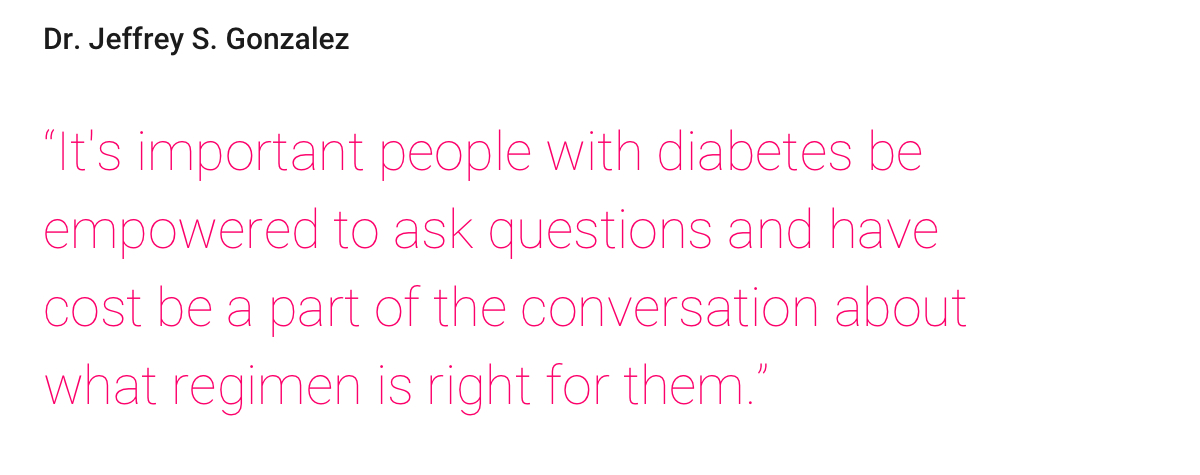Dr. Jeffrey S. Gonzalez, PhD is an international expert on medication-taking among people with type 2 diabetes. He's a Clinical Psychologist and Associate Professor in the Department of Psychology at Yeshiva University and Associate Professor in the Departments of Medicine and Epidemiology and Population Health at Albert Einstein College of Medicine. Dr. Gonzalez is a NIH-funded investigator who designs and tests programs to help people with diabetes successfully take their medications. I've known Dr. Gonzalez for over eight years. We share a passion for understanding, predicting, and promoting medication adherence in diabetes. We've shared the stage at the American Diabetes Association Scientific Session, collaborated on research and co-authored papers together, and served on the National Diabetes Education Program's Medication Adherence Task Force. I caught up with Dr. Gonzalez at the recent Behavioral Research in Diabetes Group Exchange meeting in San Antonio, Texas. We chatted about our shared interest in helping people take their medications. Here's our conversation in a nutshell...

How do you describe what you do?
My work gets at how people take their medications, what gets in the way, particularly depression and distress, what helps, and developing programs to help people become more successful.
How is taking medications different for people with diabetes?
Taking medications can be challenging. With diabetes, we're talking about taking medications for a life time. That's different from taking aspirin for a headache, and when the headache goes away, you don't need more. Or, you take one round of antibiotics to clear up an infection, and then you're done with it. For someone with diabetes, the signal of how a medication is working can be a lot less clear.
What gets in the way of people taking their medications?
Across studies and chronic conditions, forgetting is the number one reason why people don't take their medications as prescribed. But, there are two types of non-adherence. One is intentional and the other non-intentional. Intentional non-adherence is when people don't take their medications because they're concerned about side effects, cost, and the negative consequences of doing so. Non-intentional nonadherence often has to do with forgetting and not having routines that support medication taking. The more people can develop routines, automatic habits, and integrate their medication taking into their daily life, the more successful they'll be at taking their medications.
The cost of insulin and other diabetes medications is a huge challenge for people. What can people do to get around that?

Treatment for diabetes is life-saving and has enormous benefits. On the other side of these benefits is a cost. Medications have financial costs and time costs. Providers aren't always attuned to that. It's important people with diabetes be empowered to ask questions and have cost be a part of the conversation about what regimen is right for them. If there's a regimen that's just as effective, but less costly in terms of the time it takes to take the medications and the financial commitment, that medication regimen might be a better match.
What tips, strategies, and recommendations do you have for people with diabetes?
First, understand the importance and that there's a benefit to be had. The benefit is about delaying and preventing complications of diabetes.
Second, make sure you understand why you're being prescribed a particular regimen. You need to have enough information so you can fully commit. Learn what actions your different medications have and why they work together. Ideally, you should be getting some feedback from your doctor on how your regimen is working. Ask your doctor about what changes you should be seeing in your blood glucose readings, and in your A1c values. And, track that over time, so you get feedback that it's actually working and your getting a benefit.
Third, once you understand a regimen's importance and are convinced it's a good fit for your health, lifestyle, and wallet, given other options, it's important to routinize the regimen. The more integrated medication taking is in your routine, the more likely it is that you'll successfully maintain it over time. Rather than thinking of a dosing schedule in clock time, like a morning dose at 8 am and a night dose at 8 pm, think about what you do around those times every day. Tie the medication taking activity with another daily activity like a cup of coffee in the morning and brushing teeth at night. That's a more successful strategy.
Fourth, reminders are also great. People set alarms. They make check boxes on a physical calendar. They use apps. There's no one right strategy. Whatever works!
And, finally, prepare for schedule disruptions! Your schedule will be disrupted. Life gets in the way. People travel, or something unexpected will undoubtedly happen. Prepare for that. Have a back-up dose in your glove compartment, in your desk at work, or in your wife's purse. Maybe even make medication packing the first part of packing for a trip. That way you can enjoy more of your vacation and not waste it orchestrating an emergency supply.




